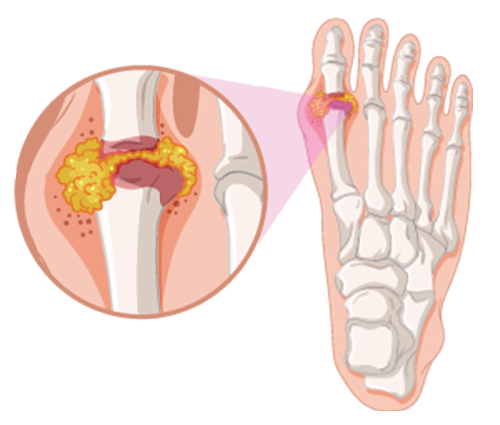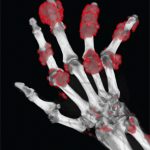
GraphicsRF.com / shutterstock.com
Although the diagnosis and treatment of gout are sometimes straightforward, practitioners encounter challenges in patients with atypical presentations, as well as those with medically complex situations or refractory disease. Here, gout experts share insights into some of these scenarios.
Flare in Hospitalized Patients
When not contraindicated, the 2020 ACR Guideline for the Management of Gout recommends colchicine, non-steroidal anti-inflammatory drugs (NSAIDs) or glucocorticoids over adrenocorticotropic hormone (ACTH) or interleukin-1 (IL-1) inhibitors, such as anakinra, for the initial treatment of gout flare on the basis of their effectiveness, general tolerability and lower cost.1
However, one treatment challenge is managing a concurrent gout flare in a patient hospitalized for other indications, such as sepsis or acute kidney insufficiency. Such concurrent medical issues can limit treatment options for gout and complicate management, as practitioners must weigh the risks and benefits of different potential treatments in the context of the whole medical picture.
For example, practitioners may hesitate to employ steroids in the context of sepsis for fear of increased infectious complications. For acute kidney insufficiency, colchicine and NSAIDs may pose too much of a danger to the kidneys. And some patients have multiple medical contraindications.

Dr. Helfgott
Simon M. Helfgott, MD, director of education and fellowship training in the Division of Rheumatology, Inflammation & Immunity, Brigham and Women’s Hospital, Boston, and the former physician editor of The Rheumatologist, notes, “The rheumatologist first needs to sort out all the confounding issues, which may include renal and cardiovascular events, infection and postoperative issues. All these can influence our choice of medications.”
In general, Dr. Helfgott prefers to use colchicine whenever possible. “Given its relatively narrow therapeutic window for patients with renal disease, sometimes we have to choose other drugs,” he adds. His next choice, if not contraindicated, is glucocorticoids. He also notes that NSAIDs should probably be avoided in most hospitalized patients due to risk of bleeding or acute kidney insufficiency.
John D. FitzGerald, MD, PhD, a clinical professor of medicine and clinical chief of the Division of Rheumatology at the University of California, Los Angeles David Geffen School of Medicine, says, “As in the outpatient setting, selecting the anti-inflammatory with fewest side effects is most important.”
Dr. FitzGerald notes that steroids would be preferred over colchicine and NSAIDs in most cases of acute kidney insufficiency, but if needed, NSAIDs may be used with caution in some patients on dialysis because they can be dialyzed away. For a mono-articulate gout flare, he prefers to try intra-articular steroids, if not contraindicated.
Anakinra can be another helpful option if colchicine, steroids and NSAIDs all carry high risk, Dr. FitzGerald adds. For example, anakinra may be helpful for a patient with diabetes and chronic kidney disease who is having a polyarticular flare or for other medically complex patients.


